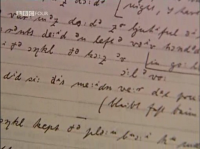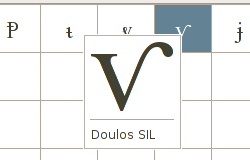Edwardian phonetics.
Un documentaire de la BBC fascinant, même si le ton du personnage principal peut ennuyer, sur les dialectes de l’Angleterre du début du 20ème siècle : conservés par les chercheurs allemand étudiant des prisonniers de guerre.
Disponnible sur one Google Video ou (en meilleur qualité) Guba.com.
The BBC documentary How The Edwardians Spoke presents audio recordings of English speakers from various dialect areas, made in 1917: German dialectologists and sound recording specialists of the time travelled around the German prisoner-of-war camps to record samples of foreign dialects. These are unusual and quite stunning documents, preserved on hundreds of shellac records.
I won’t embed the video this time — the one on Google Video is of rather poor quality, and I’m not sure how long the much better version on Guba.com will stick around. Both are downloadable — get it while it’s hot if you’re interested in this sort of thing, or watch on the web-page.
In addition to simply hearing these 100-year-old voices, and comparing them to what we know about the speech of these regions, dialect-shift, etc., there was one small bit that stood out to me in particular: The hand-written transcriptions of the German researchers, most likely produced by the Austrian-German professor of language and literature Alois Brandel, noted down in an early version of what was to become the International Phonetic Alphabet (click on the image for a larger version — it’s perfectly readable). I certainly should read up on the history of the IPA — there’s not much online, it seems. What appears to be the case, though, is that when their countries weren’t at war with each others, these German researchers and their British and other counterparts were part of the same intellectual environment.
I found the film via Crooked Timber, where Kieran Healy calls it “ponderous”. Indeed, I find it is even worse — Joan Washington, the personality who guides the viewer through the entire documentary, is a voice coach for actors and a “specialist in English accents” only in this particular, very practical sense. I find her overbearing manner and judgmental attitude to pronunciation features (monophthongs “lazier” than diphthongs and the like) rather hard to swallow, and her systematic linking-up of landscape and dialect features is rather quaint. But then, as an accent coach she will have to have developed some ad-hoc methods of getting her material across to students who, most likely, have no formal training in phonetics. Interesting to see that she is indeed using IPA to note down pronunciations she gleans in an new place — this is of course what you’d naively expect, but I’ve become wary of assuming IPA knowledge, which in places like Germany or France is successfully and routinely taught, in rudimentary form, to children aged 10 or 11, in the English-speaking world at any level.
Related posts: BBC "Word 4 Word", Show me your vowels!, Thy "thee"s, Ed Felten..., No word too small, France - accents, Branding: IPA and exotism, A relative clause there'll have to be some thinking over
Technorati (tags): Deutschland, dialects, English, IPA, language, linguistics, phonetics



